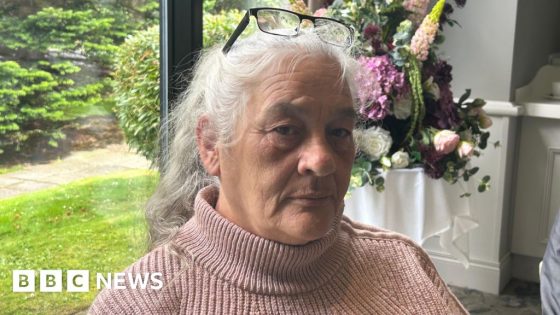The retired federal agent called 911 from his Gardena home, a barrage of bullets sounding in the background.
“My son’s been shot,” Lester Campbell, a retired Homeland Security Investigations agent, told the operator. Screaming and crying could be heard on the line.
By the end of it, Campbell’s son, Evan, was dead, shot 10 times in what prosecutors described as a “brutal gang murder” that unfolded in front of the family’s home on Nov. 13, 2020. Campbell fatally wounded one of his son’s assailants when he returned fire in the ensuing gun battle.
Prosecutors played the father’s desperate 911 call during the trial of Justin Arteaga, described as a recruit of the gang Gardena-13. Prosecutors said Evan was killed because he was seen as disrespecting the gang.
Asst. U.S. Atty. Kevin Butler told the jury that Arteaga “had been dying to become a member of Gardena-13.”
“[Arteaga] wanted to prove that he was worthy,” Butler said. “The opportunity presented itself on Nov. 13, 2020.”
Arteaga’s attorney, Humberto Diaz, argued that it wasn’t a gang-organized murder, “just a confrontation” between Evan, 29, and a reputed gang member, George Hernandez.
Read more: Jenni Rivera’s family battles over singer’s estate. ‘Money, power, greed’ tear them apart
“This was not a gang shooting,” Diaz said in court. “[Arteaga] didn’t do this to increase his position, he didn’t go and kill somebody so he could become a gang member.”
On Monday, it took the jury around two hours to find the 23-year-old Arteaga guilty of a violent crime in aid of racketeering.
Diaz declined to comment after the verdict was read.
The Campbells, including Evan’s two brothers, lived for years in the heart of Gardena-13 territory.
“To understand the gang murder of Evan Campbell, you first have to understand the world of Gardena-13,” Butler said during the trial.
Also known as Gardena Trece, the gang counts roughly 300 members and claims a territory bounded by 135th Street to the north, 190th Street to the south, Crenshaw Boulevard to the west and Gardena’s Main Street to the east, an investigator, Manuel Aguirre, wrote in an affidavit filed in federal court.
Gardena-13, like most Latino gangs in Southern California, answers to the Mexican Mafia, an organization of about 140 men drawn from the upper ranks of the region’s underworld.
“Gardena-13 does four things with its territory, it claims its territory, it marks its territory, it controls its territory and it attacks anyone who disrespects the gang within its territory,” Butler said.
Read more: Reputed godfather of the Orange County underworld says he’s victim of ‘character assassination’
The night of the shooting, prosecutors said, Campbell and his brother had just parked outside their home when they were approached by Antonio Yanez, also known as “Tank,” George “Lil Vampy” Hernandez and Arteaga, nicknamed “Hitta.”
The three men had been hanging out on a stretch of 144th Street frequented by Gardena-13 members, who call the area “the four block,” prosecutors said.
Among those who testified was Antonio Yanez, who had reached a plea agreement with the government for his role in the shooting.
Yanez, who wore a tan jail uniform, testified that on the night of the shooting he didn’t recognize Campbell’s car when it passed, which is when the men decided to follow it. Soon after, he said, he apologized to Evan’s brother for approaching “disrespectfully,” explaining that they thought the brothers were someone else.
He testified that he told Evan’s brother they “were just protecting our own.”
“Look, we live here,” Campbell’s brother said, according to Aguirre’s affidavit. “We don’t gang-bang. We mind our own business. We stay over here. Ya’ll go back around to that corner.” He texted their father, who was inside the house, telling him there was trouble and asking him to bring his gun, the affidavit said.
Around 10:47 p.m., according to security camera footage played in court, a fight broke out between Evan and Hernandez. Hernandez took a swing at Evan, who swung back, authorities said. Then, all three of the men pulled out guns.
“When Evan Campbell didn’t cower, when he showed he wasn’t intimidated, they shot and they killed him right by his house,” Butler said.
“The gangsters felt that Evan Campbell had disrespected them,” Butler said. “Disrespect in gang territory is why Evan Campbell was murdered.”
Afterward, Evan’s father “ran out and tried to save his son,” prosecutors said.
George Hernandez opened fire on Campbell’s father and he shot back, striking him in the head and the chest, according to the affidavit.
Lester Campbell, who sat in the front row throughout the trial, ran over to his son. Evan had been hit 10 times in the chest, stomach and back. Paramedics pronounced him dead 20 minutes later. George Hernandez was lying in the street about 50 feet away, gravely wounded.
Hernandez’s brother, Jesus, was also charged in connection with the shooting. Jesus Hernandez pleaded guilty in May 2022 to one count of being a felon in possession of a firearm and ammunition and is serving a prison sentence of a little more than nine years.
Four days after the shooting, agents learned that Arteaga had booked a flight to Guadalajara, Mexico, according to the affidavit. It was departing from LAX in two hours. When they apprehended Arteaga at the airport, he “appeared to be wearing the same hat worn in the video of the shooting incident,” the affidavit said.
Read more: ‘Like the Godfather’: Mafia informant’s brother killed years after dramatic testimony, arrest made
During the trial, prosecutors played a recording of Arteaga, after his arrest, speaking with an undercover informant he thought was a gang member.
“I hit him for sure,” Arteaga is heard saying on the recording, about shooting Evan Campbell.
After Arteaga’s arrest, prosecutors said, he became “a real member of the gang.”
“He had put in the work by backing up a Gardena-13 member and killing Evan Campbell,” Butler said.
For murdering him, Butler added, Arteaga got permission to get a gang tattoo — “Gardena” — across his face.
Sentencing is scheduled for Sept. 20.
This story originally appeared in Los Angeles Times.
Source Agencies



